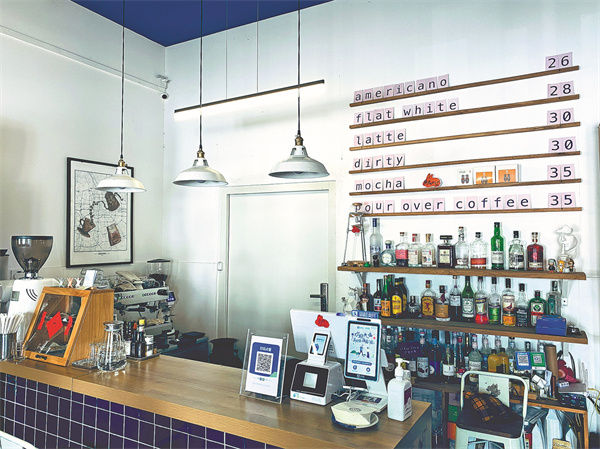
Jingmo Cafe, founded by Zhang Long, a barista with hearing impairment, is tucked away in a small hutong in downtown Beijing. Photo provided to China Daily
Pioneering paw
In December 2020, the first store of Hinichijou coffee opened in Shanghai, featuring only a hole in a wall with a QR code below for customers to scan and then place an order. Once the coffee is prepared, a furry "bear paw" hands the beverage out of the hole to the customer.
Managed by three people with disabilities, including hearing-impaired manager Chen Yingying who won first prize in coffee brewing at the sixth national vocational skill competition for disabled people, the "cute" bear paw soon went viral.
According to Wang Tian, 39, co-founder of Hinichijou, when he was preparing to open the first branch, the baristas with hearing impairments said they wanted to avoid interaction with customers, so he designed the service hole.
However, Wang noticed as the hearing-impaired baristas interacted with customers through the "bear paw", many began to open up and become more willing to engage with people.
"When they see the joyful expressions of people outside the hole, they feel needed and experience a sense of accomplishment," he said.
Hinichijou coffee, also known as "Bear Paw Cafe", recently opened a new cafe in Shanghai's Jing'an district, run by three visually impaired people who perform the duties of baristas and store manager.
The process of buying a cup of coffee isn't much different from other Hinichijou cafes. Once the order is placed by scanning the QR code at the counter, the voice assistant software on the phones of the visually impaired baristas reads out the details.
Within 100 seconds, a freshly brewed cup of hot latte is ready for the customer, while the waiting time for an Americano is even shorter.
It is Hinichijou's second cafe that has employees with visual disabilities. The company has 10 other stores in Shanghai, which employ baristas with hearing impairments.
Boom time
The value of China's coffee industry was 200.7 billion yuan ($27.81 billion) in 2022, and is projected to reach 369.3 billion yuan in 2025, according to data and estimates from delivery platform Meituan.
By June 30, 2022, the number of coffee shops in Shanghai had reached 7,857, making it one of the cities worldwide with the highest number of coffee shops.
Apart from first- and second-tier cities, coffee consumption is also expanding in third- and fourth-tier cities. Meituan's data shows that last year, third-tier cities experienced the fastest growth in the number of coffee shops, reaching a growth rate of 19 percent.
Li from the Disabled Person's Federation believes the coffee boom provides great work opportunities for disabled people who are finding employment across a wider range of industries.
There are approximately 27.8 million individuals with hearing disabilities in China, the results of the second national sampling survey on disabilities indicate.
Li said with the assistance of advanced technology and education and training, 80 percent of people with hearing impairments are capable of communicating through speech.
"This has made their daily lives more convenient and expanded their range of job opportunities," he said.
"Hearing-impaired individuals can now work as clerks, text-based customer service representatives, and an increasing number of them are pursuing careers as designers, programmers, intangible cultural heritage artisans, quality inspectors, as well as baristas and beverage mixologists, among other high-skilled professions," Li said.
Many hearing-impaired individuals prefer working in front of a computer screen, while others are enthusiastic about interacting with people in their jobs. Some have discovered that being a barista is a profession that allows them to achieve this goal.
The federation established the China Disabled Persons' Employment and Entrepreneurship Network Service Platform in 2017. The platform offers a wide range of online training, job recommendations, and livestreamed on-the-job training services and has served over 2 million people to date.
"We will increase online training efforts in areas such as baristas, professionals who make creative drinks, and more, based on demand," Li said.